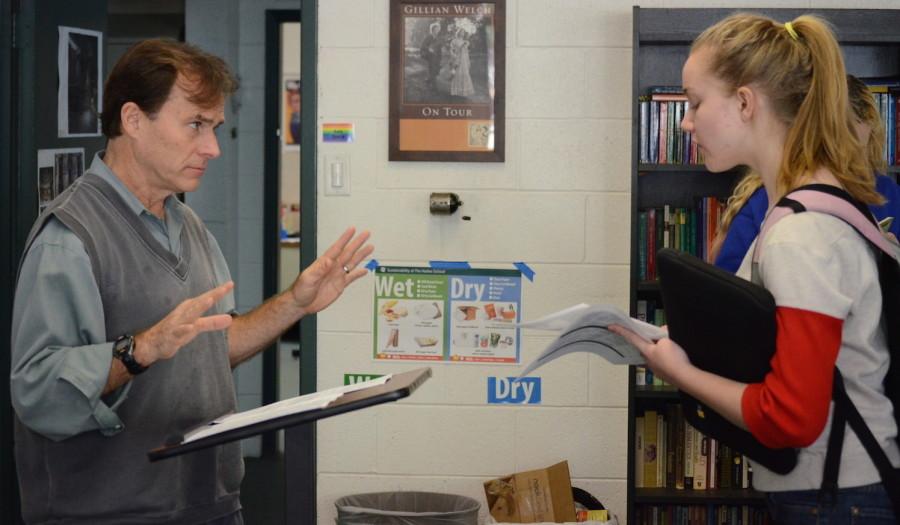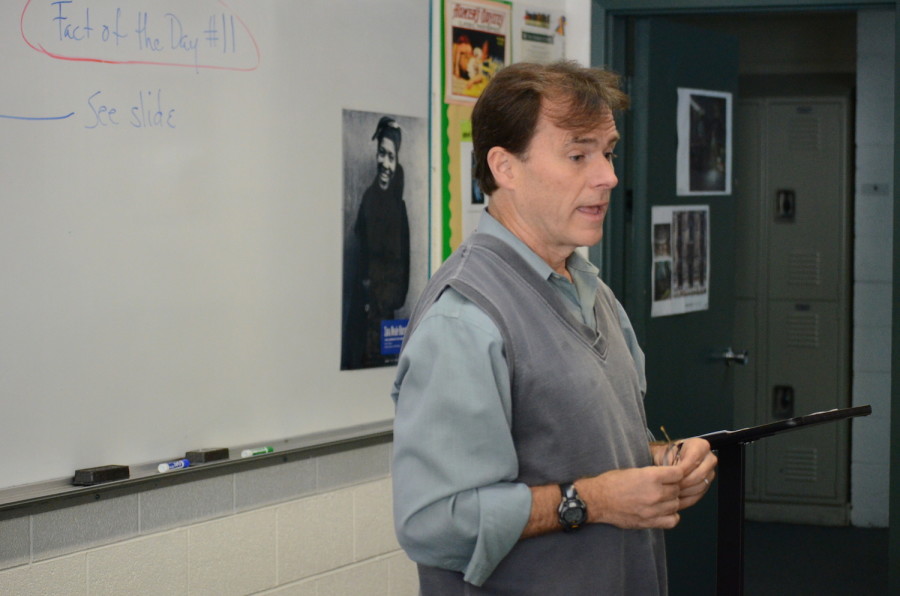Students learn more about the National Shakespeare Competition during long lunch
Marina Newman (10) asked Shuttleworth a question about the paper he handed out during the meeting. She enquired whether or not he had a copy of Hamlet.
Students gathered at Charles Shuttleworth’s room during Wednesday long lunch to receive details about the National Shakespeare Competition.
Though the competition occurred yearly, starting with the year 1983, this is the first year that the Upper School is participating in this competition.
Shuttleworth reached out to the regional branches of the English-Speaking Union (ESU) in San Francisco and made an inquiry. Although many schools in the Bay Area partake in this competition, the Upper School had not.
The round will occur two weeks from now, Feb. 18, at 11:45 p.m. in the Auditorium, and students of all grades can participate. One representative from the Upper School moves on to the regional level, which happens on March 7 at Archbishop Riordan High School, and the national round takes place on April 27 at the Lincoln Center in New York.
Competitors in past years had to perform a Shakespeare monologue, based on Folger’s edition, of no more than 20 lines. The ESU supplied a long list of suggested monologues, though students had the option to select others.
Participants spoke naturally in their own voices without accents and could not bring props or costumes. They memorized their lines although Shuttleworth will allow prompting at the Harker round as long as they say “Line.” Because of that, students must give a copy of their monologue to him before the competition.
Rehearsals take place on Feb. 3 during Extra Help in Shuttleworth’s room; Feb. 4 during long lunch in Hufnagl’s room; and Feb. 17 during Extra Help in Shuttleworth’s room once again.
The rubric was based on comprehension and expression of the character. The comprehension part relied on how much the student understood the meaning of the lines and portrayed the character accurately. The latter part relied on a clear voice and also excellent physical expression and body movement. Students had to become the character.
“I think it’s something Harker students would do really well in. They’re competitive, and I think that they’re inclined to excel at something like this,” Shuttleworth said. “I think we’ll do really well, and we’ll establish it permanently as an ongoing thing at Harker.”
The National Shakespeare Competition will see more of Harker in future years, after it becomes a regular event.
Julia Huang is a junior and Co-Organizations Editor for TALON Yearbook. This is Julia's third year on staff. In her free time, Julia enjoys watching shows...


















![“[Building nerf blasters] became this outlet of creativity for me that hasn't been matched by anything else. The process [of] making a build complete to your desire is such a painstakingly difficult process, but I've had to learn from [the skills needed from] soldering to proper painting. There's so many different options for everything, if you think about it, it exists. The best part is [that] if it doesn't exist, you can build it yourself," Ishaan Parate said.](https://harkeraquila.com/wp-content/uploads/2022/08/DSC_8149-900x604.jpg)




![“When I came into high school, I was ready to be a follower. But DECA was a game changer for me. It helped me overcome my fear of public speaking, and it's played such a major role in who I've become today. To be able to successfully lead a chapter of 150 students, an officer team and be one of the upperclassmen I once really admired is something I'm [really] proud of,” Anvitha Tummala ('21) said.](https://harkeraquila.com/wp-content/uploads/2021/07/Screen-Shot-2021-07-25-at-9.50.05-AM-900x594.png)







![“I think getting up in the morning and having a sense of purpose [is exciting]. I think without a certain amount of drive, life is kind of obsolete and mundane, and I think having that every single day is what makes each day unique and kind of makes life exciting,” Neymika Jain (12) said.](https://harkeraquila.com/wp-content/uploads/2017/06/Screen-Shot-2017-06-03-at-4.54.16-PM.png)








![“My slogan is ‘slow feet, don’t eat, and I’m hungry.’ You need to run fast to get where you are–you aren't going to get those championships if you aren't fast,” Angel Cervantes (12) said. “I want to do well in school on my tests and in track and win championships for my team. I live by that, [and] I can do that anywhere: in the classroom or on the field.”](https://harkeraquila.com/wp-content/uploads/2018/06/DSC5146-900x601.jpg)
![“[Volleyball has] taught me how to fall correctly, and another thing it taught is that you don’t have to be the best at something to be good at it. If you just hit the ball in a smart way, then it still scores points and you’re good at it. You could be a background player and still make a much bigger impact on the team than you would think,” Anya Gert (’20) said.](https://harkeraquila.com/wp-content/uploads/2020/06/AnnaGert_JinTuan_HoHPhotoEdited-600x900.jpeg)

![“I'm not nearly there yet, but [my confidence has] definitely been getting better since I was pretty shy and timid coming into Harker my freshman year. I know that there's a lot of people that are really confident in what they do, and I really admire them. Everyone's so driven and that has really pushed me to kind of try to find my own place in high school and be more confident,” Alyssa Huang (’20) said.](https://harkeraquila.com/wp-content/uploads/2020/06/AlyssaHuang_EmilyChen_HoHPhoto-900x749.jpeg)




